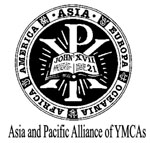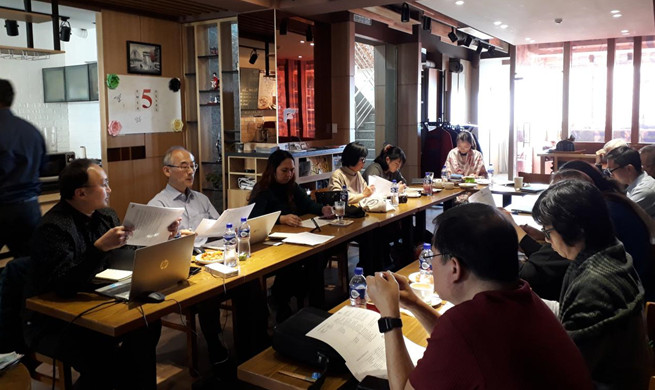 |
| ↑ PSG meeting and deliberation held at the YMCA Coffee Shop |
The following day, the PSG of YMCA Mongolia meeting was held at the YMCA Coffee Shop presided over by APAY General Secretary Nam Boo Won with the attendance of the members of the board, staff, volunteers and overseas delegates. Javkhlantugs Ganbaatar, president of Mongolia YMCA presented their 2017-2019 strategic goals and objectives consisting of youth empowerment, social relevance and impact, institutional viability and effective partnerships. Afterwards, General Secretary Munkhtsog Davaadorj presented the undertakings promoted and done in the previous two years related to this plan/strategy as well as their financial condition and the plans that will be pursued in the succeeding year. Concerning their programs and activities, they have been able to organize and carry out various events and affairs such as the opening of the YMCA education center, sports activities, tree planting, YMCA world challenge, outreach program and others activities participated in and attended by their members ,friends and supporters. They have strengthened and developed more the Global Alternative Tourism Network (GATN) program which gave opportunity to the participants to learn from one another, appreciate better and discern Mongolia’s culture and their way of life, became venue for developing and enhancing friendship between young people and also an opportunity for fostering greater understanding on how they could contribute in making the environment more sustainable. The support given by YMCA friends and partners such as Hong Kong, Taiwan and Singapore and other local supporters have truly been enormous making this annual program a good way of making the Mongolian people become more aware of the YMCA and what it does. As YMCA Mongolia moves forward to another year, they are embarking on construction of a YMCA Building in near future. They hope that with this initiative, they will be able to provide better, bigger and safer space for their members and potential users in program implementation and promotion. In the plan too, this coming year, is the development of a YMCA campsite where they will collaborate with YMCA of the USA for support and technical expertise.
 |
| ↑ PSG members meeting and dialogue with the young people |
Inspired by what they have achieved so far in recent years, the YMCA Mongolia is undeniably making things possible to sustain their growth and intensely pursue their goals and objectives.
~ Thelma P. Juntereal, MS Coordinator &
Munkhtsog Davvdorj, GS, YMCA of Mongolia
School of Peace 2018 hurdles its first month
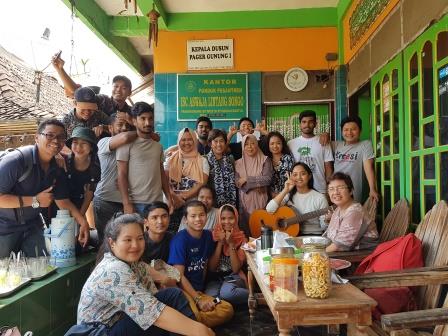 |
The School of Peace 2018 is finishing its first month and is moving on to its second month. On October 1, 2018, the participants arrived in Yogyakarta, Indonesia and were billeted at the Pusat Pengembangan Spiritualitas of Fakultas Teologi of Universitas Kristen Duta Wacana (UKDW). The program officially began with an opening liturgy and a traditional welcoming ceremony on October 2, 2018. Sixteen (16) made it to Yogyakarta out of the 20 accepted participants. Seven (7) are female, nine (9) are males. These participants were recommended by YMCAs, church and peace networks from Bangladesh, Cambodia, Laos, Indonesia, Myanmar, Philippines, Sri Lanka, Thailand, and Timor Leste. Unfortunately, four accepted participants could not come. One could not come because he preferred to help in providing relief services to his people – the survivors of the earthquake and tsunami in Donggala and Palu, Indonesia. One from Thailand YMCA had her passport expiring. Another one recommended by Albay YMCA simply did not appear, without any explanation. One got his 60-days visa to enter Indonesia but had been harassed by the Philippine Immigration officers who did not allow him to board his plane.
The hosting of the School of Peace 2018 by UKDW Fakultas Teologi is made possible through Dr. Yusak Tridarmanto, Dean for Community Affairs. Dr. Tridarmanto and his Team, the local committee takes the task of accompanying the SoP participants and facilitators. They arrange the trips to masjids, temples, churches, including the trip to watch Ramayana ballet to supplement the sessions. They do sundry things in relation to the needs of the participants.
For the first time in the history of SoP, the story and development of YMCA was discussed at the very beginning as part of the program orientation. The orientation seeks to enable the participants to recognize the work of Asia and Pacific Alliance of YMCAs (APAY) that includes the program of Interfaith Cooperation Forum (ICF). Judith Lim, treasurer of Yogyakarta YMCA supplemented the orientation by presenting the local YMCA activities. On the first two weeks, the participants examined the situation of their respective countries. They identified and analyzed the problems or conflicts of their countries by using the different tools of conflict analysis. At some point they chose specific case analysis for the exercises. They were introduced to the peacebuilding frameworks of John Paul Lederach, which was facilitated by Dr. Tabita Kartika Christiani. Muriel Orevillo-Montenegro took care of the rest sessions during the first two weeks, including the session on Galtung’s Transcend approach to conflict transformation and peacebuilding.
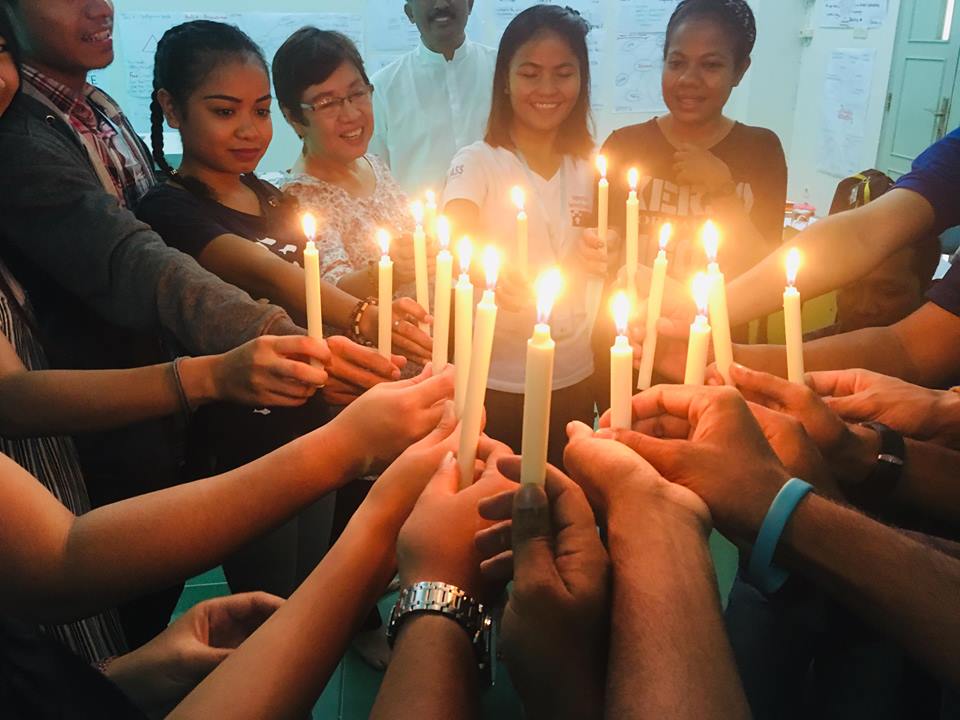 |
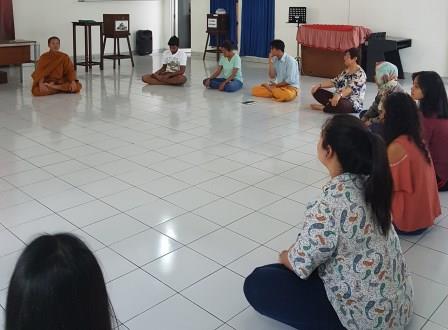 |
| ↑ Morning meditation with Dr. Putu on Hinduism |
↑ Sitting meditation intro |
In the next two weeks, the participants were deepening their understanding of religions and indigenous spiritualities, highlighting on the respective religious teachings on peacebuilding. Dr. Putu Panji Sudira and Dr. Anak Agung Alit facilitated the sessions on Hinduism and peace, including yoga meditation. The section of the curriculum on Buddhist was facilitated by Bikkhu Santacitto who introduced the Buddhist meditation and Ms. Yulianti, a Ph.D. candidate on Buddhology, who gave the participants a glimpse of the Buddhist teachings. From the Judeo-Christian perspective, Dr. Paulus S. Widjaja, dean of Fakultas Teologi of Universitas Kristen Duta Wacana (UKDW), discussed peace in the Old and New Testament. He also introduced the notion of ethnorelativism to help the participants see the different responses towards ethnocentrism that is intertwined with fear of other religions. Ms. Lien Iffah Naf’atu Fina introduced the Muslim practice of prayer, and Dr. Ahmad Rofiq discussed the teachings of the Qur’an on peace. Both are faculty of the Islamic State University of Yogyakarta. Retha Andoea demonstrated and led the Shibashi as a jumping board for the discussion on Taoism, its principles of Yin -Yang and Wu Wei facilitated by Muriel Orevillo-Montenegro. These principles, she pointed out, can be harnessed for health and peacebuilding. The last section on religions had Dr. Yusak Tridarmanto, who presented the Indigenous Spirituality, Cultural Values and Peacebuilding from the Javanese perspective.
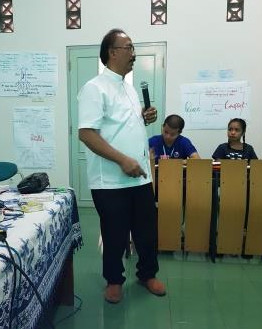 |
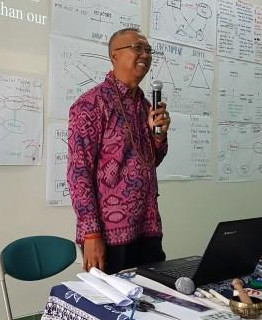 |
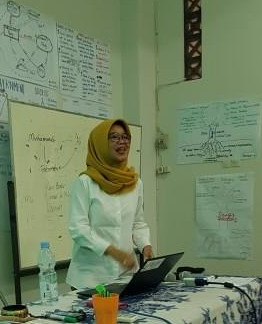 |
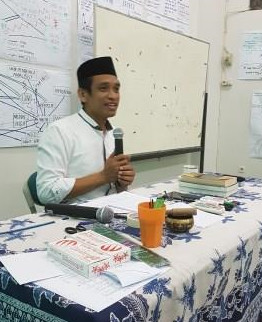 |
| ↑ (L to R) Dr. Putu Panji Sudira, Dr. Anak Agung Alit, Ms. Lien Iffah Naf'atu Fina and Dr. Ahmad Rofiq facilitated on their sessions |
On the weekend prior to trips outside the UKDW Pusat Pengembangan Spiritualitas, Hem Sopharak, the current ICF program officer, introduced photography as a tool for peace advocacy. The participants were called to take photos with intentionality as peace advocates.
On October 26-27, 2018, the participants went for an overnight visit to an Islamic boarding school, or a Pesantren called Lintang Songo (Nine Star).There, the participants got an orientation on the nature of the boarding school and had more discussion on Islamic teachings with the owner of the school, Dr. Heri along with the students that the boarding school supports. They also met the calligraphy artist who wrote each participants name in Arabic. On the second day at the pesantren, the participants spent some time in the school farm, and tried their hands on weeding the garden with Dr. Heri. The participants experienced living in the boarding house where the students lived.
The next trip of the SoP 2018 participants was for a home stay on October 28-30, 2018 in the farming community of Dusun Batur, in Salatiga. Each household hosted two persons – a participant and an interpreter in Bahasa or Javanese. Volunteers from YMCA from Yogyakarta, Solo and Salatiga helped as interpreters for the participants. Practically all of them had “first time experiences” in helping do the routine chores and tasks of their respective host families. They gathered forage, mostly napier, for the cows, and milking the cows. Others harvested dill, broccoli, chili, cabbage, raddish, lettuce, and tomatoes. Some helped in packing yoghurt for sale. One helped in preparing the seedlings for the seed beds. Some worked in the field with their host families to prepare the garden plots for planting. The home stay was capped with a fellowship with host families, participants, and interpreters around a bonfire. A farewell gathering was organized in the morning of the third day. It was a heartwarming exchange of feedbacks between the participants, their host families, and the interpreters. The debriefing cum reflection in the evening back in Yogyakarta yielded more learnings, realizations and suggestions from the participants.
One month has passed, and the participants is just beginning to make a connection with the theories they learned, with the realities outside their comfort zones. It was noted that most of the participants still had a lot to learn about their religious tradition. Moreover, most of them have expressed appreciation on the things they have learned to come handy in their respective life journeys.
~ Muriel Orevillo-Montenegro, ICF Coordinator
APAY Green Ambassadors learn about Climate Change
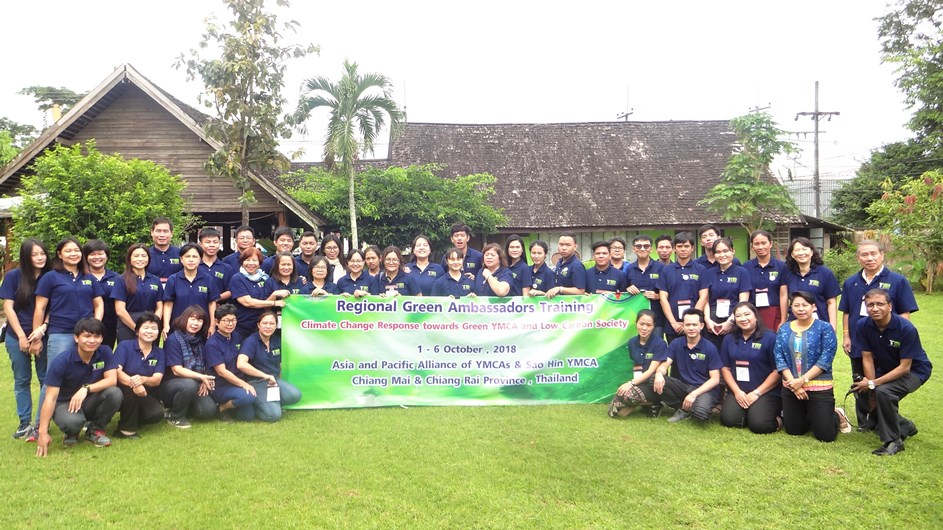
Thirty-one (31) participants from various YMCAs and universities from five countries; Laos, Myanmar, South Korea, Philippines and Thailand, attended the Regional Green Ambassadors Training held last October 1-6, 2018 in Chiang Mai and Chiang Rai, Thailand.
The 5-day training organized by the Asia and the Pacific Alliance of YMCAs (APAY) in partnership with Sao Hin YMCA, branch of Chiang Mai YMCA was filled with discussions on different environmental issues and experiential learnings on climate change education and response towards a green YMCA and a low carbon society.
The learning sessions began with a morning devotion and bible reflection led by the Sao Hin YMCA partner organization, KLDP (Karen Leadership Development Program), who focused on the message of the book of Genesis emphasizing the role of every individual as stewards of God’s creation. After the devotion, the participants had experiential learnings facilitated by YMCA Staff who brought them around the eight (8) exhibition rooms of the Environment Learning and Energy Resource Center of Sao Hin YMCA in Chiang Mai.
The exhibition rooms featured the Situation of the Environment; the increasing concentration of Carbon in the atmosphere that causes greenhouse effect and global warming, the sources of energy; Coal, Wind, Hydro and Solar, the sources of carbon and other artificial chemicals (CFCs) in the atmosphere due to the burning of fossil fuels and coals to produce electricity, to run vehicles and other manufacturing industries, the interconnectedness of air, water and land pollution affecting natural life cycle and biodiversity, the effects of mining, deforestation and garbage pollution. These exhibits awaken the consciousness of the participants about the worsening situation of the environment thus the call for Climate Change Action and Response.
The exhibit taught the participants to practice responsible ways on reducing carbon emission like garbage management and waste reduction, by practicing the 1 A and 3 R’s (Avoid, Reduce, Reuse, Recycle) and the practices of saving energy; “Switch Off, Unplug, Adjust and Change to lower energy emitting device like LED lights and TV and inverter air-conditioning units”. The participants were also encouraged to begin with conducting a Carbon Audit in their respective YMCAs and schools or household which will determine their baseline of Carbon Emissions and after which, setting a target on how much carbon they would reduce on a targeted period of time.
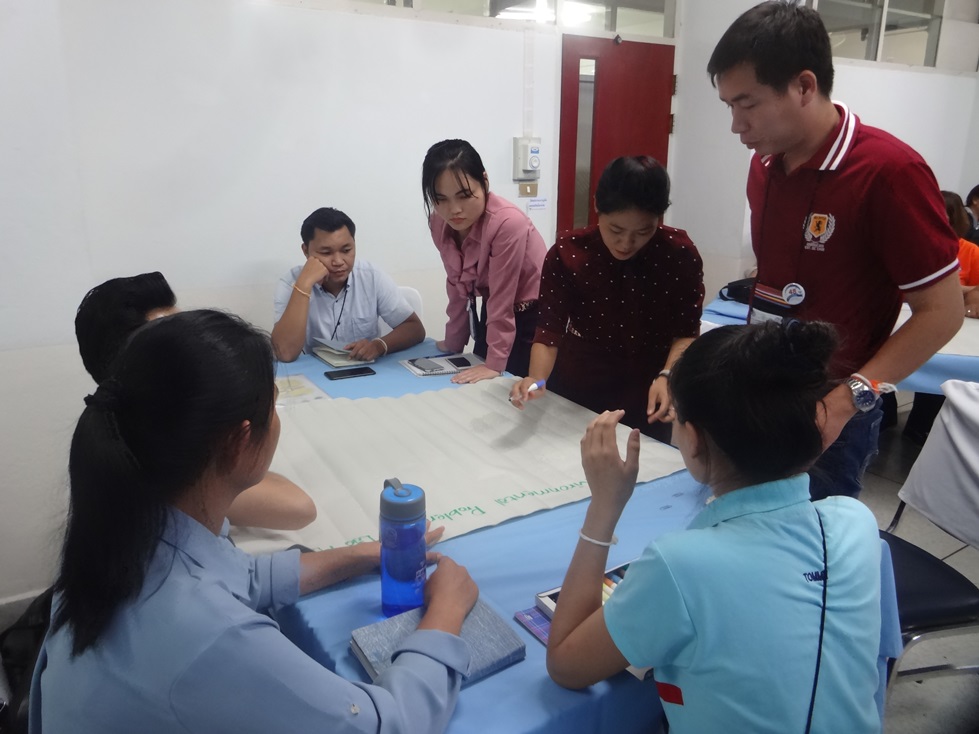 |
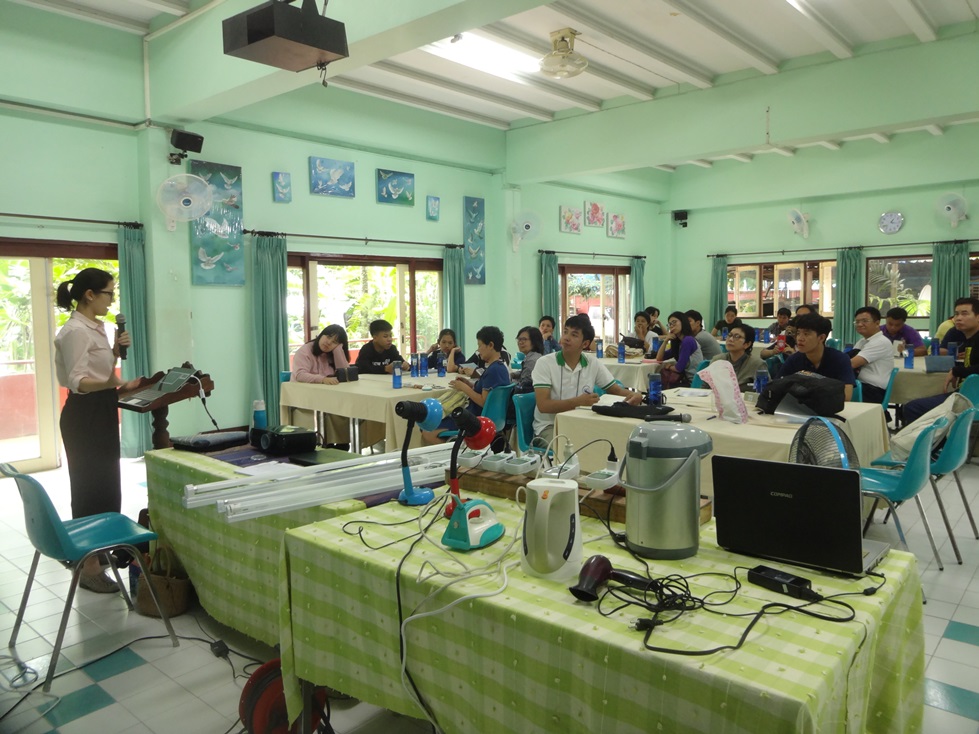 |
Another highlight of the training was the homestay experience and exposure in the Khunlao Village in Chiang Rai Province, Thailand. This village shows the best example of community engagement in forest preservation and local social enterprise. The villagers, assisted by a group named MiVana, became local coffee growers and formed a corporation that sells the organic coffee all over Thailand and other parts of the world. They take care of the forest areas where they plant their coffee trees which produce the best beans because it is grown under the shade of the big trees. After the visit to the organic coffee forest, the group was welcomed by wonderful dancing performances of the children of the Y Green School at Khunlao. This school promotes Sufficiency Economy Philosophy among the village children, teaching them about the importance of agriculture, living a simple but happy life, appreciating nature and understanding what it is to be united in taking care of one another and their community.
After the very inspiring and encouraging learnings in the first three days, the participants presented their best practices on environmental protection which continued to discussions on different Climate Change issues that each of their country is facing at present. After the discussions, the groups conducted a workshop and planning of action response which narrowed down to the three common agenda; 1. Carbon Audit (Reduction of Carbon Emission), 2. Climate Change Education and 3. Garbage Management. These common agenda will be the action points of the 31 Green Ambassadors when they get back to their respective communities.
The training was capped with an inspiring sharing session of memorable stories of the participant’s experiences. Towards the end, Teacher Dr. Wasan, a director of the Chiang Mai YMCA, encouraged the Green Ambassadors to always think that it is our divine mandate to protect and preserve creation. He emphasized that a single tree cannot be a forest so we must recognized the unity in diversity in working together towards living in harmony with nature.
~ Ma Magda Gana, YMCA of Makati, Philippines
Kerala Flood Response
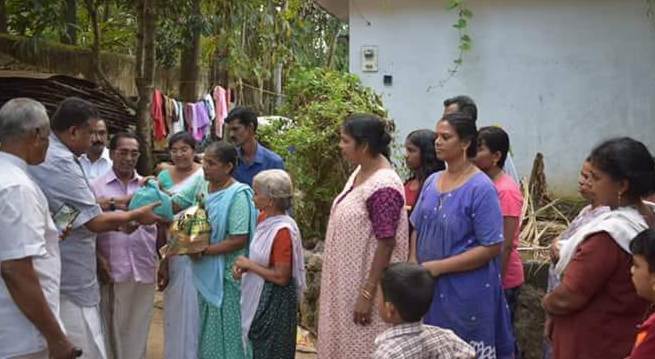 |
| ↑ Flood relief kit distribution at Kuzhikkala in Kozhencheryy sub-region
|
The Kerala YMCA distributed food, gas stoves, medical kit, blankets, beds, and dress among other emergency relief items to around 1,200 families in the areas of Wayanad, Kottayam and Ernakulam that were affected by the severe floods that affected the South Indian State of Kerala on August 2018. The unusually high rainfall during the monsoon season caused landslides and floods in all of the 14 districts of Kerala and had left over 483 people dead, 15 missing and around 1 million people evacuated.
In response to the appeal by the National Council of YMCAs of India, the world movement, the local YMCAs and supporters promptly and generously responded to support the efforts of assisting the people affected by the calamity. Through the goodwill and solidarity of the donors, the YMCA conducted both rescue and relief operations during the first phase of its response. The continuing disaster response work is now focused on the long term rehabilitation program.
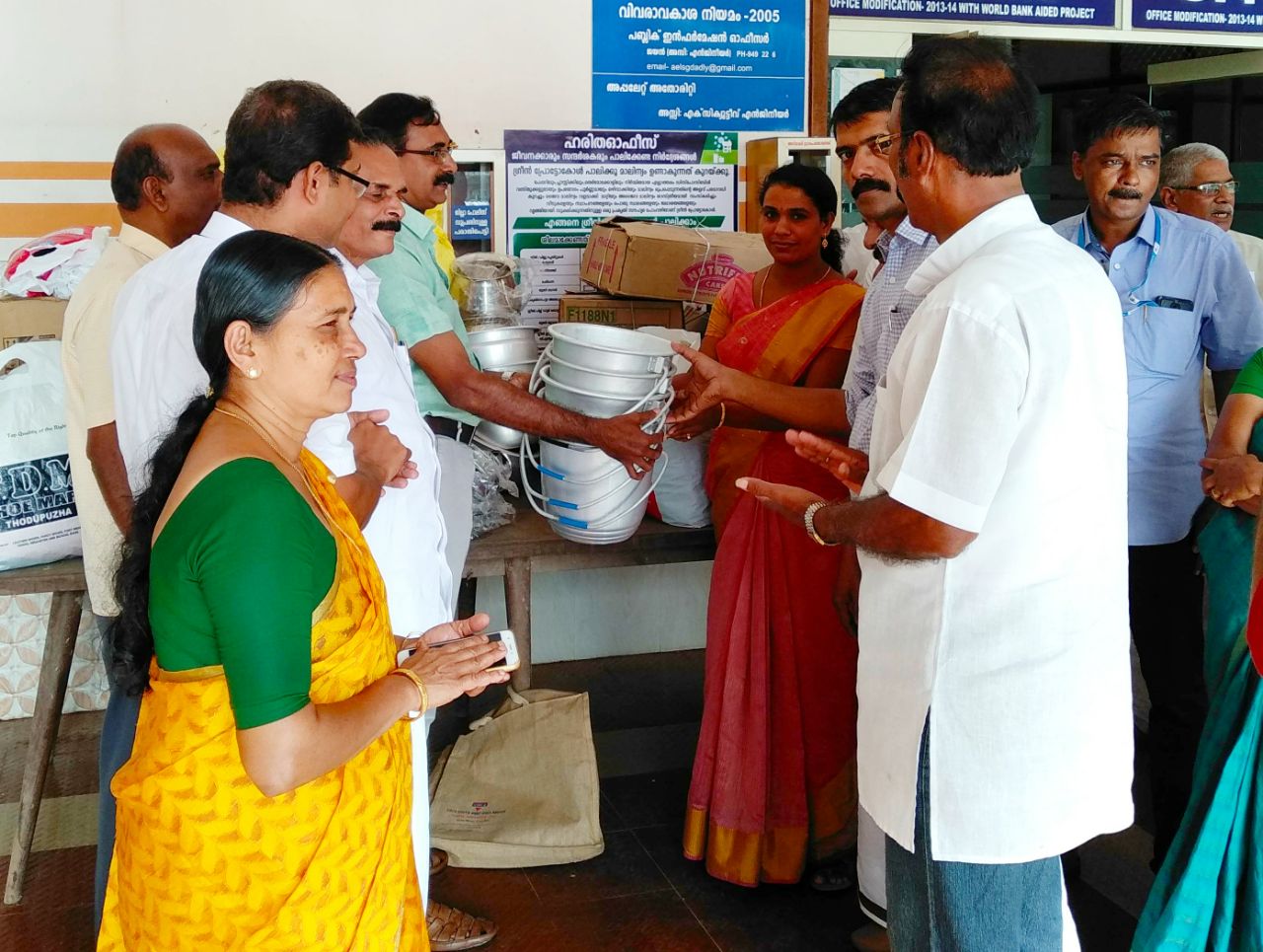 |
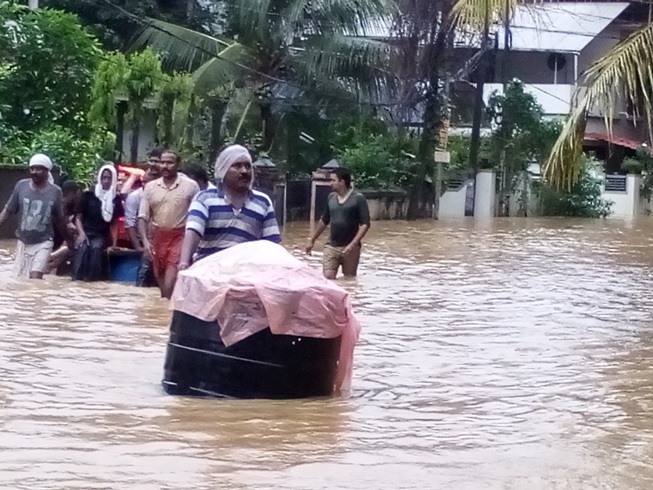 |
| ↑ Flood relief kit distribution at Idukki sub-region of YMCA
|
↑ Flood relief household goods distribution
|
Since most of the vulnerable communities including tribal communities lost their livelihoods and income source due to the damage in their agricultural field, distribution of seeds, farming-tools and other agricultural inputs will be considered. The YMCA is in consultation with the local government authority in identifying the most affected and economically backward community. The rehabilitation response will target around 200 families with priority given to those women led and most vulnerable families. The continued support of the movement particularly within the Asia and Pacific Region will be instrumental in this effort. (Reference: NCY India Kerala flood emergency response and rehabilitation program documents.)
~ Maria Cristina L. Miranda, Executive Secretary
Not interested any more?
|
